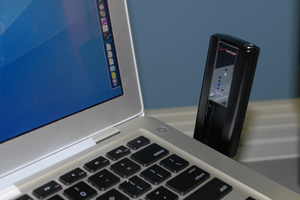Review: Verizon UM150 USB EV-DO modem


I'm currently testing the Verizon Wireless UM150 USB Modem which is a re-badged EV-DO modem manufactured by Pantech. (For the uninitiated EV-DO Rev. A increases the maximum burst rate from 2.45 Mbit/s to 3.1 Mbit/s and adds other improvements over the older EV-DO Rev. 0). Measuring 3.5 inches long and 1.2 inches wide (the pull-out antenna adds another 2.5-inches) it's not tiny, but surprisingly it fit into the tiny recessed USB port in the MacBook Air. The UM150 has a hinge that swivels on two axes allowing it to fit into most notebook USB ports without being obtrusive.
The package also comes with a and a Y–shaped extension cable which is useful for stealing extra USB power from a second port and convenient if your USB port is in a bad location. The UM150 also features a built–in microSD memory slot with 4GB+ capacity that doubles as a mass storage device, a nice feature if you use microSD.
| Image Gallery: Verizon Wireless UM150 EV-DO modem. | ||||||
According to Verizon, typical download speeds average 600–1400 kbps and typical upload speeds average 500–800 kbps. Naturally, actual speeds and coverage will vary. The VZW BroadbandAccess network is currently available in 248 major metropolitan areas and in 232 airports.
The UM150 EV-DO modem is available now from Verizon Wireless for free (after a US$50 online rebate) with a two-year contract. The service costs US$60 per month (US$0.49 per MB after that) for 5GB of access, 50MB costs US$40 per month (US$0.99 per MB after that). Both require a two-year contract. Verizon also notes that "if usage exceeds 5 GB/line/month, we reserve the right to reduce throughput speeds to a maximum of approximately 200 Kbps."
Despite the relatively high cost of the service an EV-DO can pay for itself in one trip and you can't beat its convenience. It's not for everyone though. If you don't absolutely need to be online during your layover or your have sticker shock at the price you're probably not a good candidate for this modem.